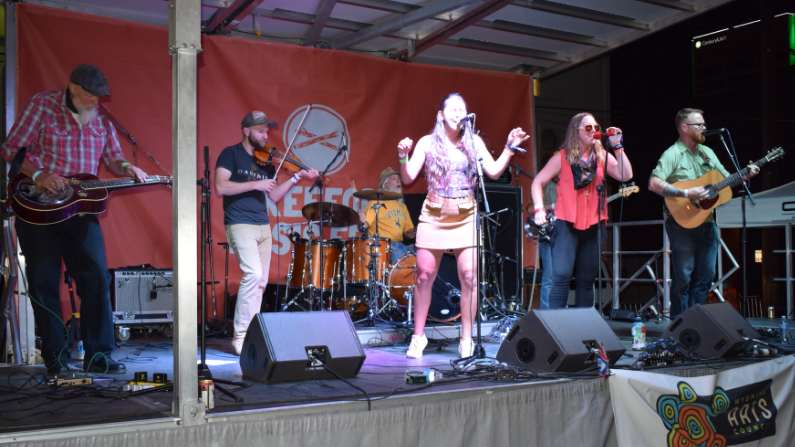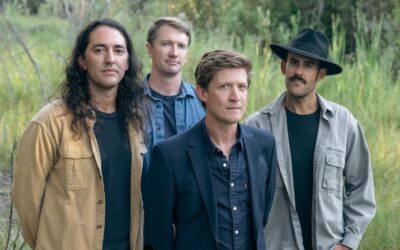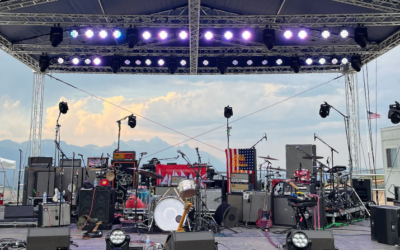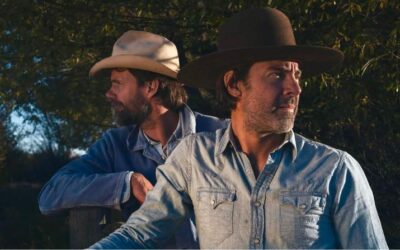The Laramie, Wyoming, based band 10 Cent Stranger utilizes three part harmonies, infectious melodies and creative instrumentation to tell stories inspired by the high plains of Mountain West. 10 Cent Stranger was one of six acts representing Wyoming during the Wyoming Art Council’s Wyoming Showcase on The Hideout stage at the recent Treefort Music Festival in Boise.
The band sat down with KHOL Music Director Jack Catlin the day after their set to discuss what it’s like to be representing Wyoming at a larger music festival, the making of their latest album and the connection between music and mental health.
Listen above for more and check out a transcript of the interview below.
KnewJack: Alright, this is KnewJack, the music director at KHOL in Jackson, Wyoming, coming to you live from the Treefort Music Festival in Boise, Idaho. I’m here with 10 Cent Stranger who performed yesterday here as part of the Wyoming showcase put on by the Wyoming Arts Council. For listeners who are new to your music, 10 Cent Stranger, can you tell us more about your sound?
Laniece Schleicher: It’s very well written songs, Bob writes most of the songs we play and I was trying to describe it yesterday and I said, It’s a lot like Wyoming. It’s like very meaningful and kind of lonely and there’s inspiration in the songs, even though maybe they feel a little hopeless at times. And it’s Americana-ish, right?
KnewJack: Yeah, yeah. Country Americana, definitively Wyoming.
Bob Lefevre: That’s the hope.
Laniece Schleicher: Because like Americana is like the misfit of country, right? And I kind of feel like that’s true.
Bob Lefevre: What do you call things if it has an acoustic guitar and you don’t really know what it is, Americana, that’s what it is. Yeah.
KnewJack: So, it’s been a tumultuous couple of years for everybody, not just with the pandemic, but protests for racial justice, the presidential elections, debates about vaccination, etc.. What role has music played for you in processing the times we’re living in?
Laniece Schleicher: Well, I was just thinking about how we we were lucky enough to live in Wyoming and we all did all the social distancing. And when we did feel like it was OK to get together to make music, we were doing that with masks on and like open spaces, but we were still able to create. Bob wrote some great music during that time and we were still able to stay connected. So I felt really lucky the whole time and that the woods are just right there, so you don’t have to be around anybody.
Bob Lefevre: It’s definitely easier to not be around people when you live in Wyoming than when you live somewhere else. I think that people, you know, people acted like, Oh, this is this opportunity where you’re going to have all this time to create things and go be creative. And for me, I just found the opposite to be true like it was. It was like pulling teeth to write songs and losing that kind of, I guess when you’re in a band, you think you’re going to go do shows and things like that.
KnewJack: You lose the flow. You kind of lose that momentum.
Bob Lefevre: Yeah. And when you have something that you’re working towards like, Oh, OK, we have these shows coming up, then you kind of feel like you have some momentum and losing that, I think, was kind of hard for us to kind of feel like there was purpose beyond just kind of getting together and hanging out when we did get together.
Laniece Schleicher: We were also sad. I mean, it was so it’s a very it was really hard. It still is hard and almost harder now because now it feels like it’s not. I don’t know, it’s just so different than it was a year ago.
Bob Lefevre: Yeah, I think we thought we were going to be beyond stuff, and it seems like we’re not.
KnewJack: So how important is it for folks? You know, we’re wearing masks and we’re being careful, but it is very exciting to be able to get back to live shows. How important is that for you guys?
Bob Lefevre: Yeah, we’ve been lucky this summer to play outside almost. Have we played inside yet? We played one show inside in June, I think, and everything else has been outside, including last night here, the Wyoming showcase was outside, which was nice.
Laniece Schleicher: I’m excited. I’m glad we get to have music back because like this, that sense of community that only can be found in live music is happening again. And I love that Treefort’s done such a great job of keeping it so safe and masking and vaccing and like, I think they’ve been really responsible about how they’ve done it.
KnewJack: And how was your experience yesterday? And can you touch on the importance of representing Wyoming at a larger festival like this?
Bob Lefevre: I think a lot of people might struggle to find Wyoming on a map to begin with and thinking that music isn’t something that’s going on there. You know, and I think there’s there’s always been a lot of really cool music in Wyoming, and I think that Wyoming just kind of based on the, you know, there’s not that many people. So I think people get exposed to more different types of music than they do in other places where it’s very easy to just go see the one sub genre music that you like. If you live in a big city and if you’re in Wyoming, if you want to see music, that’s not really an option. You just kind of see what you can see. And I think that that makes for some really interesting bands and musicians and things like that.
KnewJack: I love that point because I was that guy living in L.A. forever and came to Wyoming and was forced to listen to all this great new music that I’ve discovered, like Americana, folk, bluegrass, all that stuff. So we are a community radio station at Cato, based in Jackson Hole, and we love bringing new music from both national and regional acts like you to our listeners. Do you have a favorite hometown community radio station and what do you love about it?
Bob Lefevre: WPR out of Laramie at the KUWR right? I hope I got that right. No, yeah, we have a great relationship with those guys and we were on the air with them a few weeks back.
Laniece Schleicher: And they just do a great job of cultivating community and inviting people to play and playing all sorts of different kinds of artists. I just really appreciate them a lot.
KnewJack: In your bio, it states the storytelling foundation of each song is brought to life with powerful three part harmonies and creative instrumentation. Bob, you’re the principal songwriter of the group. What is your creative process when gaining inspiration, constructing a song, album, etc.?
Bob Lefevre: I think about what’s making me feel depressed, and I try to make a song out of that and then these guys make it. Pretty.
Laniece Schleicher: And then he doubts it.
Bob Lefevre: And then I doubt, yeah. Every song I write is both the last song I write or I’m going to write and the worst song I’ve ever written. And then eventually I grow to like them.
KnewJack: These guys help you flesh it out.
Bob Lefevre: Yeah, they make me see the parts. They add the bells and whistles that make it into more than just evidence of my depression. And yeah, that’s pretty much it.
KnewJack: You recently released your debut album, which must be very exciting, “When You Move On” is the title, can you walk us through the making of the record?
Laniece Schleicher: I just thought it was amazing. We went down to Fort Collins to the blasting room with Chris Beeble. It was during COVID like early COVID times, and so we would all make sure to get tested and make sure everybody was, you know, negative, negative, negative. And then it was a break from, it felt like real life, right? It was like, we’re going out of town and we’re going to go record and
Bob Lefevre: and we got bumped twice. We had to move because of restrictions.
Laniece Schleicher: And so by the time we did, we were really well practiced up and rehearsed, and we had very strong ideas about how we wanted it to go. And we knocked out so many more songs than we anticipated at that time. And we just dug in and it was amazing.
Bob Lefevre: We recorded it almost entirely live. Like, I don’t know that we really overdubbed. I don’t think Jay and Jackson really overdubbed any solos. You know, maybe there were little bits here and there, but Laniece did most of the vocals on on her stuff live, the other thing that was going on last summer were these huge fires all over. And I made the mistake of, I couldn’t stand to be in my house for one more minute, went and rode my mountain bike and hit the studio with no voice. So that was like what I remember is just having a screaming headache from trying to sing with my voice messed up from smoke. And you did it beautifully.
Laniece Schleicher: It sounded really good. So it was great.
KnewJack: All of you seem to have a lot of fun together on stage, and the energy is infectious to the audience in front of you. You joke that 10 Cent is a social club first and a band second, I love that. Is that a conscious effort on your part when performing or just a natural occurrence once you all hop on that stage together,
Laniece Schleicher: It’s impossible to not have a good time with these people. Like I told you, we devolve when we’re together for this long because it is truly, like, joyous to be around each other. I love them so much like
Bob Lefevre: Sean had me laughing the hardest I’ve ever laughed in my life. After the show last night, so
KnewJack: Can you tell us what that was? Its not, not P.C..
Bob Lefevre: He scared some guys with a tree.
KnewJack: That’s the root of it. Pun intended.
Laniece Schleicher: Ohhh good one.
KnewJack: All right. Finishing up, I just wanted to touch on a little more serious subject. You are also a mental health therapist. I’ve interviewed a lot of musicians and the subject of mental health comes up a lot. Why do you think music and mental health are so intrinsically tied together?
Laniece Schleicher: I believe a lot of the reasons that people struggle with mental health is lack of connection,and I think often people are seeking connection in different ways, whether that’s like substances or music, you know, whatever the outlet is. And so I think often us creative types have a tendency toward feeling alone inside of ourselves a lot of the time, I think that that can go and kind of create more discomfort within the selves of people. So I think a big part of that is that connection. And if you can find outlets for that, it’s amazing.
KnewJack: And and Bob, is it cathartic for you to write the songs and see them come to light eventually?
Bob Lefevre: At first, it’s just a struggle. I mean, you know, I think what she’s touching on that people are, Messed up people are driven to the arts as a way to kind of deal with that. And I think that that’s why it’s depressing to not be able to do it for 18 months or whatever. If I didn’t have any sort of outlet, it would be bad news and miserable to be around me, I’m sure.
KnewJack: We’re all so glad to have music back in our lives. Thank you 10 Cent Stranger for joining me here at KHOL. You can hear 10 Cent Stranger’s music right here on KHOL during our local music hour that airs every weekday, 3 to 4 p.m. I’m Jack Catlin and this is KHOL Jackson.
Support for this coverage is made possible by the Wyoming Arts Council and the National Endowment for the Arts.





